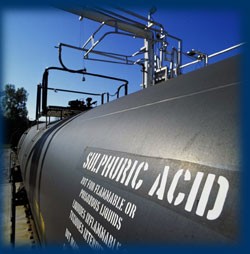
Sulphuric acid is a chemical compound of sulphur with the chemical formula H2SO4. It is a colourless, oily, very viscous and hygroscopic liquid. Sulphuric acid is one of the strongest acids, and it is very corrosive. Mineral acid forms two series of salts, acid sulphates and sulphates, in which, compared to the free radical, one or two protons are replaced by some cations.
Sulphuric acid is one of the most technically important chemicals, and it is one of the most widely used chemical precursors. In 1993, about 135 million tons of sulphuric acid were produced. It is mainly used in the production of fertilizers and to present other mineral acids, such as hydrochloric acid or phosphoric acid. It is commonly used in aqueous solutions of various concentrations.
Sulphuric acid is a colourless viscous liquid that solidifies at a temperature of 3oC when it has 100% concentration. Otherwise, the freezing point depends on the concentration: at 93% it is -32°C, at 78% is -38°C and at 65% is -64°C.
Technical sulphuric acid can often be brown due to organic impurities. When heated above the boiling point of 279.6 °C, the sulphuric acid vaporizes, and in this form of vapour, there is excess sulphur trioxide.
At a temperature of 338 °C, the vapours have an acid content of 98.3%, and they correspond to an azeotropic mixture of water and sulphuric acid.
Warm up more, at 450° C, sulphuric acid dissociates into water and complete sulphur trioxide.
In purification, it is successfully used in pH correction for the chemical stage if the pH value of the raw water exceeds the optimal range for coagulation.